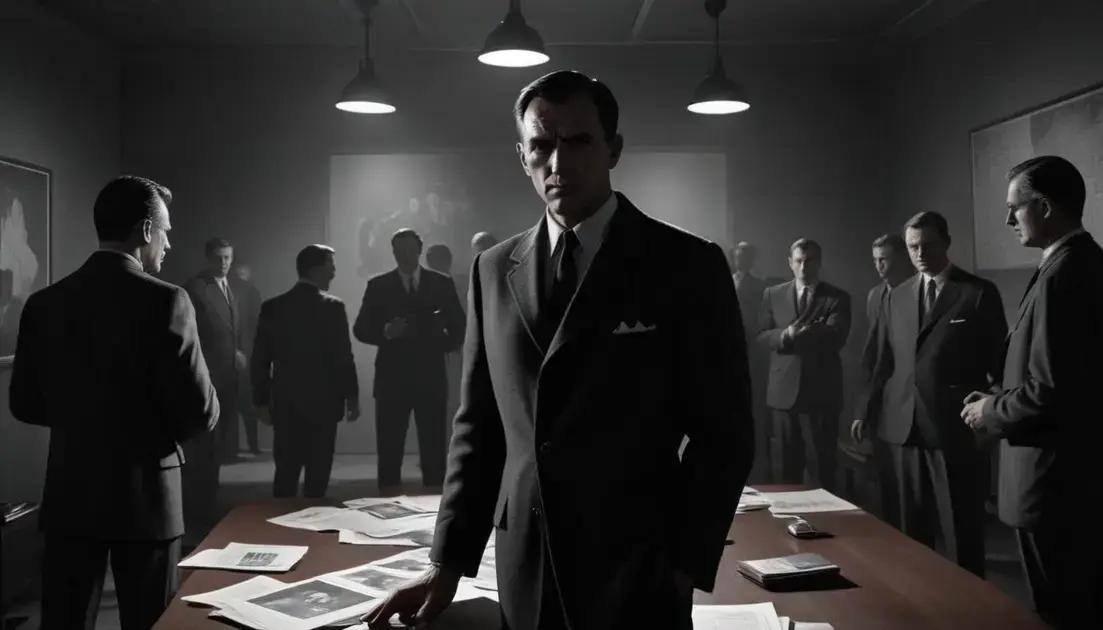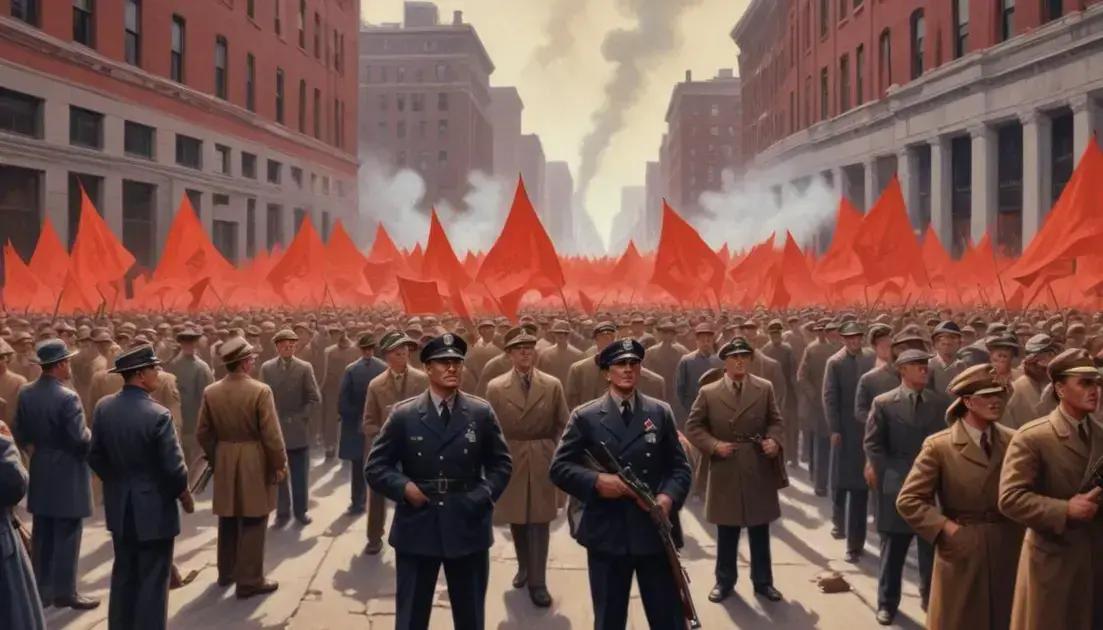
The Spy in Literature: The Cold War in Fiction
The legacy of Cold War fiction significantly influences modern literature, shaping themes of paranoia and trust. Authors draw inspiration from this era, exploring complex character dilemmas and global conflicts. Key writers like John le Carré and Robert Ludlum have left a lasting mark, encouraging contemporary storytellers to examine social commentary and human behavior through the lens of espionage. These narratives remain relevant today, reminding readers of the intricate connections between past and present in literature.
In the realm of fiction, the Cold War has been a goldmine for storytellers, fueling narratives of betrayal, espionage, and suspense. Explore how writers transformed historical tension into captivating tales.
The Role of Spies in Cold War Literature
The role of spies in Cold War literature is fascinating. Writers used these characters to explore trust, betrayal, and intense suspicion. They painted spies not just as heroes but also as people caught in a web of conflict.
The Complexity of Spy Characters
Spies often struggle with their identities. They face tough choices that can affect nations. For example, a spy might have to choose between loyalty to their country and protecting someone they love.
Famous Spy Novels
Many novels captured the spirit of espionage. Works like “The Spy Who Came in from the Cold” by John le Carré show the bleak reality of being a spy. These stories reveal the psychological toll that such a life brings.
Spy Techniques and Tools
Writers often included real techniques spies used during the Cold War. From coded messages to hidden microphones, these details made stories more believable. Readers get a glimpse into the secretive world of espionage.
The Impact of Spy Stories
Cold War literature influenced how people view spies today. It created an image of spies as both glamorous and tragic. These representations shape our understanding of truth and deception in global politics.
Spies in literature remind us of the tension of their time. They reflect the fears and hopes of society, making us think about the blurry line between right and wrong.
Major Works and Authors
There are many major works and authors in Cold War literature. Each has contributed to the theme of espionage in unique ways. Their stories capture tension and fear, drawing readers into the drama.
John le Carré
John le Carré is one of the best-known authors in this genre. His novel, “The Spy Who Came in from the Cold,” shows the grim realities of spying. It remains a classic for its deep character development and moral complexity.
Robert Ludlum
Robert Ludlum is famous for creating thrilling plots. His Jason Bourne series is popular for its fast-paced action and twists. The stories blend adventure with the shadowy world of spies.
Graham Greene
Graham Greene’s works often explore the moral dilemmas faced by spies. In “The Quiet American,” he examines the impact of foreign influence and personal conflict during the Cold War. His writing gives insight into the human side of espionage.
Other Notable Authors
Many other writers also shaped Cold War literature. Authors like Len Deighton and Kim Philby brought unique perspectives. They added layers to the understanding of espionage on both personal and political levels.
These major works not only entertain but also invite readers to think about trust and betrayal. They reflect the complex emotions surrounding the Cold War era.
Themes of Paranoia and Trust
Themes of paranoia and trust run deep in Cold War literature. These themes reveal the fears and doubts of the time. Characters often grapple with who to trust when betrayal can come from anywhere.
The Nature of Paranoia
Paranoia is a driving force in many stories. Characters might suspect their friends or even their government. This creates a tense atmosphere where every interaction feels loaded with meaning.
Trust Issues
Trust is fragile in these narratives. Spies often face dilemmas about whether to share information. They worry about revealing too much and putting themselves at risk.
Examples in Literature
In novels like “The Spy Who Came in from the Cold,” trust is a key factor. Characters must decide whom they can rely on. This theme adds layers to their personal struggles and the overarching political context.
The Impact on Readers
These themes resonate with readers today. They prompt us to think about our own relationships and trust in society. The exploration of paranoia and trust makes Cold War literature engaging and relatable.
Impact of the Cold War on Modern Literature
The impact of the Cold War on modern literature is significant. Many authors still draw inspiration from that era. They explore themes of conflict, identity, and the struggle for power.
Themes of Conflict
Cold War literature often explores conflict on many levels. Writers examine personal struggles and global tensions. The sense of uncertainty created many gripping stories that resonate with readers today.
Character Development
Characters in modern literature often reflect the complex emotions of the Cold War. They face dilemmas of loyalty and trust. Authors create multi-dimensional characters that are relatable and fascinating.
Political and Social Commentary
Many works offer sharp critiques of politics and society. They help readers understand the consequences of fear and mistrust. This commentary remains relevant, connecting historical events to modern issues.
Influence on Genre
The Cold War also shaped genres like thriller and espionage. Writers developed new plots and styles, making them popular. This influence can be seen in movies and TV shows today.
The legacy of Cold War literature is evident in how modern writers approach storytelling. It challenges readers to reflect on the past while considering its relevance in today’s world.
The Legacy of Cold War Fiction
The legacy of Cold War fiction continues to shape literature today. Many themes and styles first seen during that time remain relevant. Writers still draw from this rich history.
Influence on Future Generations
Cold War fiction has inspired many authors. They explore similar themes of espionage, trust, and betrayal. These writers often pay homage to their predecessors while adding their own voices.
Cross-Genre Appeal
Cold War stories have impacted various genres. From thrillers to science fiction, elements of Cold War fiction appear everywhere. This blending keeps the themes fresh and interesting for readers.
Reflections on Society
These works serve as reflections on human nature. They explore how fear and paranoia can shape actions. This examination of society enriches narratives and encourages deeper thinking.
The Continued Relevance
As global tensions rise, the legacy of Cold War fiction becomes even more important. It provides insights into current events and the human experience. Readers find that these stories resonate in today’s complex world.
The enduring nature of Cold War fiction proves its impact. It teaches us valuable lessons about conflict, integrity, and the human condition.
Conclusion
In conclusion, the impact of Cold War fiction on modern literature is clear. Themes of paranoia and trust continue to resonate in stories today. Writers draw from these rich narratives, exploring complex characters and moral dilemmas.
The legacy of this genre shapes how we view conflicts and relationships. As our world changes, the lessons from Cold War literature remain relevant. They remind us of the power of stories to reflect our fears and hopes.
Cold War fiction not only entertains but also prompts us to think critically about history and society. By understanding these influences, we can appreciate how far literature has come and where it might lead us next.


